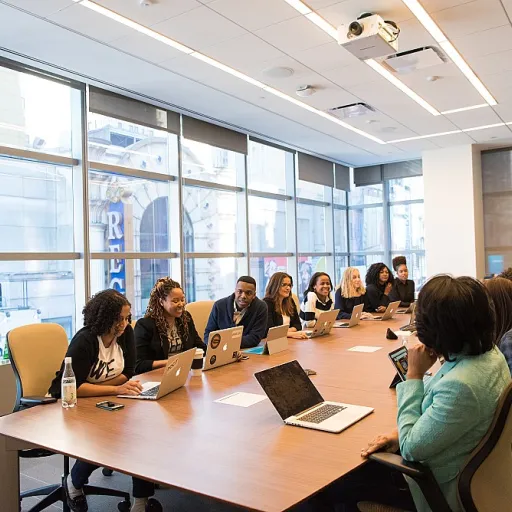
Overview of wa state lunch break laws
Key requirements for meal and rest breaks in Washington
In Washington state, labor laws set clear standards for meal and rest breaks to protect employees during their work hours. These rules apply to most employees, whether they are full-time or part-time, and are enforced by the Washington State Department of Labor & Industries. Understanding these requirements is essential for both employees and employers to ensure compliance and foster a positive workplace environment.
- Meal breaks: Employees working more than five consecutive hours must receive at least a 30-minute meal period. This meal break should begin no less than two hours and no more than five hours from the start of the shift. Unless the employee is completely relieved of duties, the meal period must be paid.
- Rest breaks: For every four hours worked, employees are entitled to a paid 10-minute rest break. These rest periods should be scheduled as close to the middle of each work period as possible.
- Overtime and additional breaks: If an employee works more than three hours beyond their regular shift, they must receive an additional 30-minute meal break.
Employers are responsible for ensuring these breaks are provided and for maintaining accurate records of hours worked, meal periods, and rest breaks. Employees should be aware of their rights to take these breaks and the procedures for reporting missed breaks or violations of break laws.
Break time regulations are not just about compliance—they shape the broader workplace culture and impact employee well-being. For more on how these laws influence daily work life, see our post on effective conflict of interest policy templates and their role in fostering transparency and trust in the workplace.
| Break Type | Duration | Paid/Unpaid | When Required |
|---|---|---|---|
| Meal Break | 30 minutes | Unpaid (unless duties continue) | After 5 hours of work |
| Rest Break | 10 minutes | Paid | Every 4 hours worked |
| Additional Meal Break | 30 minutes | Unpaid (unless duties continue) | For overtime exceeding 3 hours |
Staying informed about Washington break laws helps both employers and employees create a fair and productive work environment. The next sections will explore how these laws influence workplace culture, common challenges in implementation, and best practices for supporting employee breaks.
How lunch break laws shape workplace culture
The impact of lunch breaks on daily work culture
Lunch break laws in Washington state do more than just set legal requirements—they actively shape the way employees and employers interact throughout the workday. When a workplace consistently respects meal and rest break laws, it sends a clear message about valuing employee well-being and productivity. On the other hand, inconsistent or unclear break policies can lead to confusion, stress, and even conflict.How structured breaks influence employee morale
Providing regular meal periods and rest breaks helps employees recharge, leading to better focus and higher job satisfaction. In Washington, labor laws require a 30-minute meal break for shifts over five hours, and paid 10-minute rest breaks for every four hours worked. When employers honor these requirements, employees feel respected and trusted, which can boost morale and foster loyalty.- Clear break time policies reduce misunderstandings between employees and management.
- Consistent enforcement of meal and rest periods supports a healthier work-life balance.
- Breaks help prevent burnout, especially in roles with long hours or high demands.
Break laws as a reflection of company values
How a company implements meal and rest break laws often reflects its broader approach to workplace culture. Employers who prioritize compliance with Washington state labor laws demonstrate a commitment to fairness and employee rights. This approach can set a positive tone across teams, encouraging open communication and mutual respect. For organizations navigating sudden changes—such as when a long-term employee leaves during an internal investigation—having strong, transparent break policies can help maintain stability and trust. For more on how these events affect company culture, see this resource on what it means for your company culture.Why break policies matter in the long run
Ultimately, the way employers handle meal periods, rest breaks, and overall break time can have lasting effects on both employee satisfaction and organizational success. Adhering to Washington break laws is not just about legal compliance—it’s about building a workplace where employees feel valued, leading to better retention and a stronger corporate culture.Common challenges in implementing lunch break policies
Barriers to Consistent Break Compliance
Even with clear Washington state labor laws on meal breaks and rest periods, many workplaces face challenges in putting these rules into practice. The law requires employers to provide a 30-minute meal period for shifts over five hours and a 10-minute paid rest break for every four hours worked. However, the reality on the ground can be more complicated.
- Operational demands: In industries with high customer volume or tight production schedules, employees may find it difficult to take uninterrupted breaks. Employers sometimes struggle to balance business needs with legal requirements.
- Lack of awareness: Some employees and even supervisors may not fully understand Washington break laws, leading to missed or shortened meal and rest breaks.
- Workplace culture: If the culture prioritizes constant productivity, employees might feel pressured to skip or work through their break time, even when entitled to it by law.
- Documentation and tracking: Employers are responsible for ensuring compliance, but keeping accurate records of meal periods and rest breaks can be challenging, especially in fast-paced environments.
Impact on Employee Wellbeing and Morale
When meal breaks and rest periods are not consistently provided, employees can experience fatigue, stress, and decreased job satisfaction. Over time, this can lead to higher turnover and lower productivity. On the other hand, when employers respect break laws and encourage regular breaks, it fosters a healthier, more engaged workforce.
Connecting Break Policies to Broader Corporate Culture
How an organization approaches meal and rest breaks is often a reflection of its overall corporate culture. For example, companies that value employee wellbeing are more likely to go beyond minimum state requirements, offering flexible break time or additional paid rest periods. Understanding the role of personality and social style in shaping workplace culture can also help employers create break policies that truly support their teams.
Ultimately, implementing effective break policies in line with Washington state labor laws is not just about legal compliance. It's about building trust, supporting employee health, and creating a positive work environment where everyone can thrive.
Employee rights and employer responsibilities
Key rights for employees under Washington break laws
In Washington state, labor laws are clear about employee rights regarding meal and rest breaks. Employees working more than five consecutive hours are entitled to a meal period of at least 30 minutes. This meal break must begin no less than two hours and no more than five hours from the start of the shift. If the work period is longer than 11 hours, a second meal period is required. These meal periods are unpaid unless the employee is required to remain on duty or at a prescribed work site, in which case the meal time must be paid.
Rest breaks are also mandated. For every four hours worked, employees must receive a paid rest break of at least 10 minutes. These rest periods should be scheduled as close to the middle of the work period as possible. If an employee’s shift is less than three hours, a rest break is not required.
Employer obligations and compliance
Employers in Washington have a legal responsibility to provide these breaks and ensure that employees are relieved of all duties during their meal and rest periods. Employers cannot require employees to work through their meal or rest breaks, nor can they combine rest breaks with meal periods to shorten the workday. Additionally, employers must keep accurate records of hours worked, including the timing of meal and rest breaks, to demonstrate compliance with state labor laws.
- Meal periods: At least 30 minutes for shifts over five hours
- Rest breaks: At least 10 minutes for every four hours worked
- Meal breaks are unpaid unless duties are performed during the break
- Rest breaks are always paid
- Employers must schedule breaks at appropriate times during the work period
Understanding the impact of non-compliance
If an employer fails to provide the required meal or rest breaks, they may be in violation of Washington state labor laws. Employees have the right to report violations to the Washington State Department of Labor & Industries. Employers found in violation may face penalties, and employees may be entitled to back pay for missed paid breaks. It is crucial for both employers and employees to understand their rights and responsibilities to maintain a fair and compliant workplace culture.
Addressing conflicts and violations
Steps to Take When Break Rights Are Not Respected
When employees in Washington state believe their meal or rest break rights are not being honored, it is important to know the appropriate actions to address these concerns. Both employees and employers have responsibilities under state labor laws, and understanding the process can help resolve conflicts more effectively.- Document the Issue: Employees should keep records of missed meal periods, rest breaks, or any denied break time. Note the date, time, and circumstances for each incident. This documentation can be crucial if a formal complaint is needed.
- Communicate with Management: Many conflicts can be resolved by discussing the issue directly with a supervisor or human resources. Employers are often willing to address misunderstandings about break laws or clarify company policies regarding meal and rest periods.
- Review Company Policies: Employees should review their employer’s written break policies. Employers in Washington are required to follow state labor laws, but some workplaces may offer additional paid or unpaid break time. Understanding these policies helps employees know what to expect and what is required by law.
- Seek Guidance from the Washington State Department of Labor & Industries (L&I): If internal discussions do not resolve the issue, employees can contact L&I for guidance. The department provides resources on state break laws, including meal and rest periods, and can help mediate disputes.
- File a Complaint if Necessary: When violations persist, employees have the right to file a formal complaint with L&I. The agency investigates claims related to missed meal breaks, rest periods, and other wage and hour issues. Employers found in violation of Washington break laws may face penalties and be required to compensate affected employees.
Employer Obligations to Prevent and Address Violations
Employers in Washington state are expected to actively ensure compliance with break laws. This includes:- Providing clear information about meal and rest break policies to all employees
- Training managers to schedule and enforce required break periods
- Monitoring work schedules to ensure employees receive their entitled meal and rest breaks during each work period
- Responding promptly to employee concerns about missed breaks or overtime
When Legal Action Becomes Necessary
If internal and administrative remedies do not resolve break law violations, legal action may be considered. Employees may consult with a labor attorney to discuss options for recovering unpaid wages or addressing repeated violations of meal and rest period laws. Legal action is typically a last resort, but it underscores the importance of both employees and employers understanding their rights and responsibilities under Washington state labor laws.Best practices for fostering a healthy break culture
Encouraging Consistent Break Schedules
One of the most effective ways to support a healthy break culture in the workplace is by promoting regular, predictable break times. When employees know when to expect their meal and rest breaks, it reduces stress and helps them plan their work periods more efficiently. Employers in Washington state should clearly communicate break schedules and ensure they align with state labor laws, including the required 30-minute meal period for shifts over five hours and 10-minute rest breaks for every four hours worked.
Clear Communication and Training
Employers should provide training on Washington break laws and company policies regarding meal and rest periods. This helps employees understand their rights and responsibilities, and it ensures managers are equipped to support compliance. Posting break policies in common areas and including them in employee handbooks can reinforce this knowledge.
Flexible Approaches to Meet Diverse Needs
Not every employee has the same needs when it comes to breaks. Some may prefer to take their meal break earlier or later in their shift, while others might need additional rest periods due to the nature of their work. Allowing some flexibility, within the boundaries of state law, can improve morale and productivity. Employers should consider reasonable requests for alternative break times, as long as they meet the minimum requirements for meal and rest periods.
Monitoring Compliance and Gathering Feedback
Regularly reviewing break schedules and soliciting feedback from employees can help identify issues before they become problems. Employers should monitor whether breaks are being taken as required and address any barriers that prevent employees from taking their full meal or rest breaks. Anonymous surveys or suggestion boxes can encourage honest feedback about break policies and practices.
Promoting the Value of Breaks
Leaders and managers should model healthy break habits by taking their own meal and rest breaks and encouraging their teams to do the same. Recognizing the importance of break time for employee well-being, focus, and productivity helps reinforce a positive workplace culture. Remind employees that breaks are not just a legal requirement, but also a key part of maintaining energy and reducing burnout.
- Ensure all employees are aware of their rights to meal and rest breaks under Washington state law.
- Provide paid rest breaks and unpaid meal periods as required, and track compliance with labor laws.
- Address any reported violations or conflicts promptly and fairly.
- Encourage open communication about break needs and challenges.
By prioritizing these best practices, employers in Washington can foster a workplace where employees feel respected, supported, and empowered to take the breaks they need during their hours worked.












